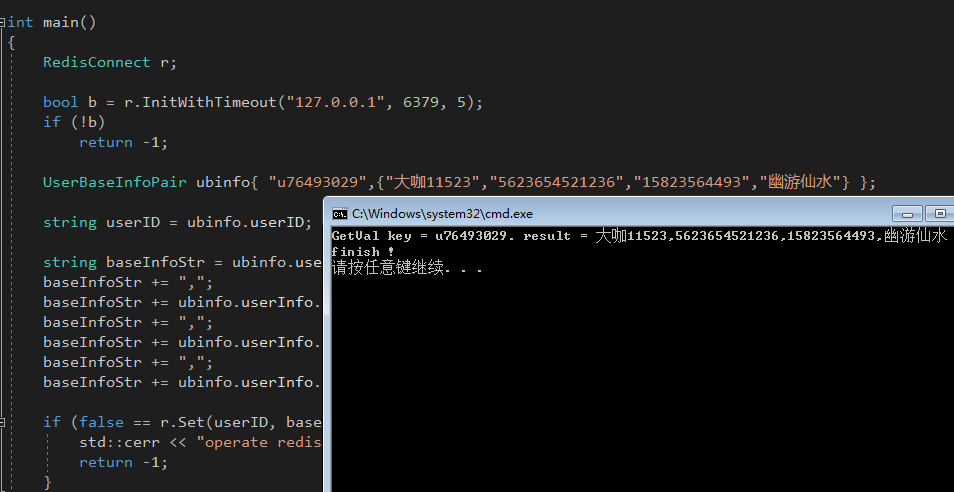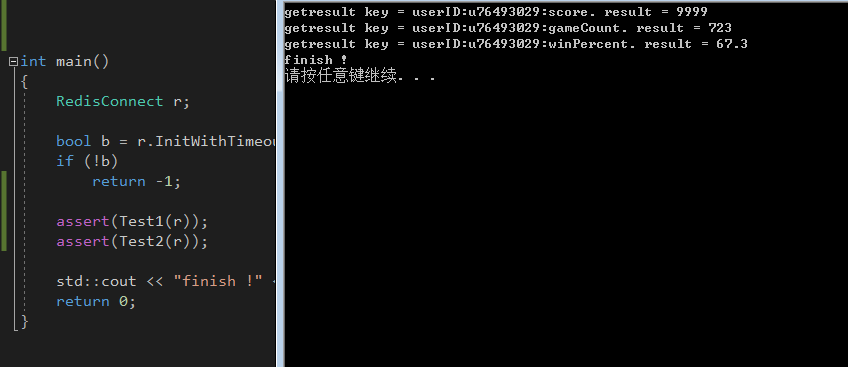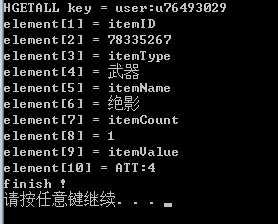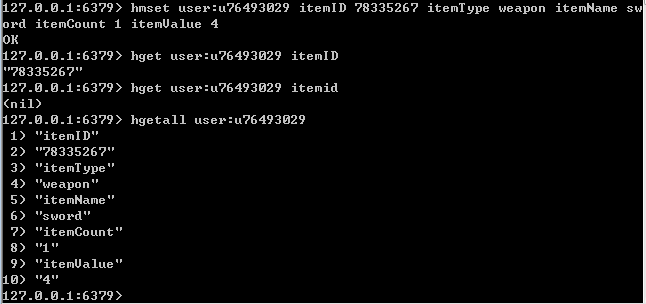redis在游戏服务器中的使用初探(三) 信息存储
摘要:
搭建了服务器环境 有了客户端 我们来假想下以下应用场景:
我们简单举个实例来描述下Hash的应用场景,比如我们要存储一个用户信息对象数据,包含以下信息:
用户ID,为查找的key,
存储的value用户对象包含姓名userName,密码校验值passwordMD5,手机号码telephoneNum , 微信名称wechatName 等信息.
将如何在redis中存储和操作?
搭建了服务器环境 有了客户端 我们来假想下以下应用场景:
我们简单举个实例来描述下Hash的应用场景,比如我们要存储一个用户信息对象数据,包含以下信息:
用户ID,为查找的key,
存储的value用户对象包含姓名userName,密码校验值passwordMD5,手机号码telephoneNum , 微信名称wechatName 等信息.
如果用普通的key/value结构来存储, 可以使用这种方式来存储:
(1) 第一种方式将用户ID作为查找key,把其他信息封装成一个对象以序列化的方式存储,需要一次次地发送和返回。
如:set "u76493029" "大咖11523,5623654521236,15823564493,幽游仙水"
这种方式的缺点是,增加了序列化/反序列化的开销,并且在需要修改其中一项信息时,需要把整个对象取回,并且修改操作需要对并发进行保护,引入CAS等复杂问题。
// myRedisCli.cpp: 定义控制台应用程序的入口点。
// #include "stdafx.h"
#include <assert.h>
#include <winsock2.h>
#include <string.h>
#include <tuple>
#include <iostream>
#include <sstream>
#include <string>
#include <string.h>
#include"hiredis/hiredis.h" using namespace std; class RedisConnect {
public:
RedisConnect() :redisCon(nullptr), reply(nullptr) {} bool Init(const std::string& ip, int port) {
if (nullptr != redisCon) {
return false;
}
redisCon = redisConnect(ip.c_str(), port);
if (redisCon->err) {
std::cerr << "error code : " << redisCon->err << ". " << redisCon->errstr << std::endl;
return false;
} return true;
}
void freeReply()
{
if (nullptr != reply)
{
::freeReplyObject(reply);
reply = nullptr;
}
} template<class T>
bool GetVal(const std::string& key, T& value) {
return Get(key, value);
} template<class T, class... Args>
bool HashSet(const std::string command, T head, Args... rest) {
std::stringstream ss;
ss << command << " " << head << " ";
return HashSetInner(ss, rest...);
} template<typename T>
bool Set(const std::string & key, const T& value)
{
bool bret = false;
std::stringstream ss;
ss << "SET " << key << " " << value;
std::string s;
getline(ss, s);
return Set(s);
} bool InitWithTimeout(const std::string& ip, int port, int seconds) {
if (nullptr != redisCon) {
return false;
}
struct timeval tv;
tv.tv_sec = seconds;
tv.tv_usec = ;
redisCon = redisConnectWithTimeout(ip.c_str(), port, tv);
if (redisCon->err) {
std::cerr << "error code : " << redisCon->err << ". " << redisCon->errstr << std::endl;
return false;
}
return true;
} ~RedisConnect() {
freeReply();
if (nullptr == redisCon) {
redisFree(redisCon);
redisCon = nullptr;
}
}
private:
void GetString(const std::string & key)
{
freeReply();
reply = (redisReply*)::redisCommand(redisCon, "GET %s", key.c_str());
} bool Get(const std::string& key, std::string & value) {
bool bret = false;
GetString(key);
if (nullptr == reply) {
std::cout << "Failed to execute " << __FUNCTION__ << std::endl << std::endl;
return bret;
}
else if (reply->type == REDIS_REPLY_NIL) {
std::cout << __FUNCTION__ << ". Key = \"" << key << "\" find nothing" << std::endl << std::endl;
return bret;
}else if( reply->type != REDIS_REPLY_STRING) {
std::cout << "Failed to execute " << __FUNCTION__ << std::endl << std::endl;
return bret;
}
value = reply->str;
bret = true;
return bret;
} bool Get(const std::string& key, int & value) {
bool bret = false;
GetString(key);
if (nullptr == reply) {
std::cout << "Failed to execute " << __FUNCTION__ << std::endl << std::endl;
return bret;
}
else if (reply->type == REDIS_REPLY_NIL) {
std::cout << __FUNCTION__ << ". Key = \"" << key << "\" find nothing" << std::endl << std::endl;
return bret;
}
else if (reply->type != REDIS_REPLY_STRING) {
std::cout << "Failed to execute " << __FUNCTION__ << std::endl << std::endl;
return bret;
}
value = ::atoi(reply->str);
bret = true;
return bret;
} bool Get(const std::string& key, float & value) {
bool bret = false;
GetString(key);
if (nullptr == reply) {
std::cout << "Failed to execute " << __FUNCTION__ << std::endl << std::endl;
return bret;
}
else if (reply->type == REDIS_REPLY_NIL) {
std::cout << __FUNCTION__ << ". Key = \"" << key << "\" find nothing" << std::endl << std::endl;
return bret;
}
else if (reply->type != REDIS_REPLY_STRING) {
std::cout << "Failed to execute " << __FUNCTION__ << std::endl << std::endl;
return bret;
}
value = ::atof(reply->str);
bret = true;
return bret;
} bool HashSetInner(std::stringstream& ss)
{
std::string data;
getline(ss, data);
//std::cout << __FUNCTION__ << " " << data << std::endl;
bool bret = false;
freeReply();
reply = (redisReply*)::redisCommand(redisCon, data.c_str()); if (reply->type == REDIS_REPLY_ERROR ||
(reply->type == REDIS_REPLY_STATUS && _stricmp(reply->str, "OK") != ))
{
if (reply->str != nullptr) {
std::cout << reply->str << std::endl;
}
std::cout << "Failed to execute " << __FUNCTION__ << std::endl << std::endl;
return bret;
} bret = true; return bret;
} template<class T, class... Args>
bool HashSetInner(std::stringstream& ss, T head, Args... rest)
{
ss << head << " ";
return HashSetInner(ss, rest...);
} bool Set(std::string data)
{
bool bret = false;
freeReply();
reply = (redisReply*)::redisCommand(redisCon, data.c_str()); if (!(reply->type == REDIS_REPLY_STATUS && _stricmp(reply->str, "OK") == ))
{
std::cout << reply->str << std::endl;
std::cout << "Failed to execute " << __FUNCTION__ << std::endl;
return bret;
}
bret = true;
return bret;
} redisContext* redisCon;
redisReply * reply;
}; typedef struct userscore {
string userID;
int score;
}UserScore; typedef struct userwinpercent {
string userID;
float winpercent;
}UserWinPercent; int main()
{
RedisConnect r; bool b = r.InitWithTimeout("127.0.0.1", , );
if (!b)
return -; UserScore us{ "user:u76493029:socre", };
UserWinPercent uwp{ "user:u76493029:winPercent",67.3 }; if (false == r.Set(us.userID, us.score) || false == r.Set(uwp.userID, uwp.winpercent)) {
std::cerr << "operate redis error!" << std::endl;
return -;
}
int score = ;
float winpercent = 0.0;
if (false == r.GetVal(us.userID, score) || false == r.GetVal(uwp.userID, winpercent)) {
std::cerr << "operate redis error!" << std::endl;
return -;
}
else {
std::cout << "key = " << us.userID << ". find value = " << score << std::endl;
std::cout << "key = " << uwp.userID << ". find value = " << winpercent << std::endl;
} std::cout << "finish !" << std::endl;
return ;
}
运行结果如图:

redis原生命令在客户端验证如下:
 (此版本redis中文支持不太好)
(此版本redis中文支持不太好)
(2) 第二种方法是这个用户信息对象有多少成员就存成多少个key-value对儿,用用户ID+对应属性的名称作为唯一标识来取得对应属性的值,不需要一次次地设置,可以一次设置多个,但命令信息有些冗余。
比如userid对应玩家的分数 棋牌玩家的游戏场数 玩家的胜率等
如:mset user:u76493029:socre 9999 user:u76493029:gameCount 723 user:u76493029:winPercent 67.3
虽然省去了序列化开销和并发问题,但是用户ID为重复存储,如果存在大量这样的数据,内存浪费还是非常可观的。
使用上一篇的hredis库进行代码操作 代码如下:
// myRedisCli.cpp: 定义控制台应用程序的入口点。
// #include "stdafx.h"
#include <assert.h>
#include <winsock2.h>
#include <string.h>
#include <tuple>
#include <iostream>
#include <sstream>
#include <string>
#include <string.h>
#include"hiredis/hiredis.h" using namespace std; class RedisConnect {
public:
RedisConnect() :redisCon(nullptr), reply(nullptr) {} bool Init(const std::string& ip, int port) {
if (nullptr != redisCon) {
return false;
}
redisCon = redisConnect(ip.c_str(), port);
if (redisCon->err) {
std::cerr << "error code : " << redisCon->err << ". " << redisCon->errstr << std::endl;
return false;
} return true;
}
void freeReply()
{
if (nullptr != reply)
{
::freeReplyObject(reply);
reply = nullptr;
}
} template<class T>
bool GetVal(const std::string& key, T& value) {
return Get(key, value);
} template<class T, class... Args>
bool HashSet(const std::string command, T head, Args... rest) {
std::stringstream ss;
ss << command << " " << head << " ";
return HashSetInner(ss, rest...);
} template<typename T>
bool Set(const std::string & key, const T& value)
{
bool bret = false;
std::stringstream ss;
ss << "SET " << key << " " << value;
std::string s;
getline(ss, s);
return Set(s);
} bool InitWithTimeout(const std::string& ip, int port, int seconds) {
if (nullptr != redisCon) {
return false;
}
struct timeval tv;
tv.tv_sec = seconds;
tv.tv_usec = ;
redisCon = redisConnectWithTimeout(ip.c_str(), port, tv);
if (redisCon->err) {
std::cerr << "error code : " << redisCon->err << ". " << redisCon->errstr << std::endl;
return false;
}
return true;
} ~RedisConnect() {
freeReply();
if (nullptr == redisCon) {
redisFree(redisCon);
redisCon = nullptr;
}
}
private:
void GetString(const std::string & key)
{
freeReply();
reply = (redisReply*)::redisCommand(redisCon, "GET %s", key.c_str());
} bool Get(const std::string& key, std::string & value) {
bool bret = false;
GetString(key);
if (nullptr == reply) {
std::cout << "Failed to execute " << __FUNCTION__ << std::endl << std::endl;
return bret;
}
else if (reply->type == REDIS_REPLY_NIL) {
std::cout << __FUNCTION__ << ". Key = \"" << key << "\" find nothing" << std::endl << std::endl;
return bret;
}else if( reply->type != REDIS_REPLY_STRING) {
std::cout << "Failed to execute " << __FUNCTION__ << std::endl << std::endl;
return bret;
}
value = reply->str;
bret = true;
return bret;
} bool Get(const std::string& key, int & value) {
bool bret = false;
GetString(key);
if (nullptr == reply) {
std::cout << "Failed to execute " << __FUNCTION__ << std::endl << std::endl;
return bret;
}
else if (reply->type == REDIS_REPLY_NIL) {
std::cout << __FUNCTION__ << ". Key = \"" << key << "\" find nothing" << std::endl << std::endl;
return bret;
}
else if (reply->type != REDIS_REPLY_STRING) {
std::cout << "Failed to execute " << __FUNCTION__ << std::endl << std::endl;
return bret;
}
value = ::atoi(reply->str);
bret = true;
return bret;
} bool Get(const std::string& key, float & value) {
bool bret = false;
GetString(key);
if (nullptr == reply) {
std::cout << "Failed to execute " << __FUNCTION__ << std::endl << std::endl;
return bret;
}
else if (reply->type == REDIS_REPLY_NIL) {
std::cout << __FUNCTION__ << ". Key = \"" << key << "\" find nothing" << std::endl << std::endl;
return bret;
}
else if (reply->type != REDIS_REPLY_STRING) {
std::cout << "Failed to execute " << __FUNCTION__ << std::endl << std::endl;
return bret;
}
value = ::atof(reply->str);
bret = true;
return bret;
} bool HashSetInner(std::stringstream& ss)
{
std::string data;
getline(ss, data);
//std::cout << __FUNCTION__ << " " << data << std::endl;
bool bret = false;
freeReply();
reply = (redisReply*)::redisCommand(redisCon, data.c_str()); if (reply->type == REDIS_REPLY_ERROR ||
(reply->type == REDIS_REPLY_STATUS && _stricmp(reply->str, "OK") != ))
{
if (reply->str != nullptr) {
std::cout << reply->str << std::endl;
}
std::cout << "Failed to execute " << __FUNCTION__ << std::endl << std::endl;
return bret;
} bret = true; return bret;
} template<class T, class... Args>
bool HashSetInner(std::stringstream& ss, T head, Args... rest)
{
ss << head << " ";
return HashSetInner(ss, rest...);
} bool Set(std::string data)
{
bool bret = false;
freeReply();
reply = (redisReply*)::redisCommand(redisCon, data.c_str()); if (!(reply->type == REDIS_REPLY_STATUS && _stricmp(reply->str, "OK") == ))
{
std::cout << reply->str << std::endl;
std::cout << "Failed to execute " << __FUNCTION__ << std::endl;
return bret;
}
bret = true;
return bret;
} redisContext* redisCon;
redisReply * reply;
}; typedef struct userscore {
string userID;
int score;
}UserScore; typedef struct userwinpercent {
string userID;
float winpercent;
}UserWinPercent; int main()
{
RedisConnect r; bool b = r.InitWithTimeout("127.0.0.1", , );
if (!b)
return -; UserScore us{ "user:u76493029:socre", };
UserWinPercent uwp{ "user:u76493029:winPercent",67.3 }; if (false == r.Set(us.userID, us.score) || false == r.Set(uwp.userID, uwp.winpercent)) {
std::cerr << "operate redis error!" << std::endl;
return -;
}
int score = ;
float winpercent = 0.0;
if (false == r.GetVal(us.userID, score) || false == r.GetVal(uwp.userID, winpercent)) {
std::cerr << "operate redis error!" << std::endl;
return -;
}
else {
std::cout << "key = " << us.userID << ". find value = " << score << std::endl;
std::cout << "key = " << uwp.userID << ". find value = " << winpercent << std::endl;
} std::cout << "finish !" << std::endl;
return ;
}
运行结果如图:

redis原生命令在客户端验证如下:

(3)第三个,如果key下的value很多,而且各自的属性值互相是独立的。例如玩家包里的道具,那么使用上面的方法存储搜索起来其实是一种效率很低的方案。
Redis提供的Hash很好的解决了这个问题,Redis的Hash实际是内部存储的Value为一个HashMap,并提供了直接存取这个Map成员的接口
如:hmset user:u76493029 itemID 78335267 itemType 武器 itemName 刀 itemCount 1 itemValue 4
也就是说,Key仍然是用户ID, value是一个Map,这个Map的key是成员的属性名,value是属性值,这样对数据的修改和存取都可以直接通过其内部Map的Key(Redis里称内部Map的key为field), 也就是通过 key(用户ID) + field(属性标签) 就可以操作对应属性数据了,既不需要重复存储数据,也不会带来序列化和并发修改控制的问题。很好的解决了问题。
这里同时需要注意,Redis提供了接口(hgetall)可以直接取到全部的属性数据,但是如果内部Map的成员很多,那么涉及到遍历整个内部Map的操作,由于Redis单线程模型的缘故,这个遍历操作可能会比较耗时,而另其它客户端的请求完全不响应,这点需要格外注意。
// myRedisCli.cpp: 定义控制台应用程序的入口点。
// #include "stdafx.h"
#include <assert.h>
#include <winsock2.h>
#include <string.h>
#include <tuple>
#include <iostream>
#include <sstream>
#include <string.h>
#include <string>
#include <assert.h>
#include"hiredis/hiredis.h" using namespace std; class RedisConnect {
public:
RedisConnect() :redisCon(nullptr), reply(nullptr) {} bool Init(const std::string& ip, int port) {
if (nullptr != redisCon) {
return false;
}
redisCon = redisConnect(ip.c_str(), port);
if (redisCon->err) {
std::cerr << "error code : " << redisCon->err << ". " << redisCon->errstr << std::endl;
return false;
} return true;
}
void freeReply()
{
if (nullptr != reply)
{
::freeReplyObject(reply);
reply = nullptr;
}
} template<class T>
bool GetVal(const std::string& key, T& value) {
return Get(key, value);
} template<class T, class... Args>
bool HashSet(const std::string command, T head, Args... rest) {
std::stringstream ss;
ss << command << " " << head << " ";
return HashSetInner(ss, rest...);
} bool HGetAll(const string& key) {
bool bret = false;
freeReply();
string commandStr = "hgetall ";
commandStr += key;
reply = (redisReply*)::redisCommand(redisCon, commandStr.c_str());
if (nullptr == reply || == reply->elements ) {
std::cout << "Failed to execute " << __FUNCTION__ << std::endl << std::endl;
return bret;
}
std::cout << "HGETALL key = " << key << std::endl;
for (int i = ; i < reply->elements; i++) {
redisReply* p = reply->element[i];
std::cout << "element[" << i + << "] = " << p->str << std::endl;
} bret = true;
return bret;
} template<typename T>
bool Set(const std::string & key, const T& value)
{
bool bret = false;
std::stringstream ss;
ss << "SET " << key << " " << value;
std::string s;
getline(ss, s);
return Set(s);
} bool InitWithTimeout(const std::string& ip, int port, int seconds) {
if (nullptr != redisCon) {
return false;
}
struct timeval tv;
tv.tv_sec = seconds;
tv.tv_usec = ;
redisCon = redisConnectWithTimeout(ip.c_str(), port, tv);
if (redisCon->err) {
std::cerr << "error code : " << redisCon->err << ". " << redisCon->errstr << std::endl;
return false;
}
return true;
} ~RedisConnect() {
freeReply();
if (nullptr == redisCon) {
redisFree(redisCon);
redisCon = nullptr;
}
}
private:
void GetString(const std::string & key)
{
freeReply();
reply = (redisReply*)::redisCommand(redisCon, "GET %s", key.c_str());
} bool Get(const std::string& key, std::string & value) {
bool bret = false;
GetString(key);
if (nullptr == reply) {
std::cout << "Failed to execute " << __FUNCTION__ << std::endl << std::endl;
return bret;
}
else if (reply->type == REDIS_REPLY_NIL) {
std::cout << __FUNCTION__ << ". Key = \"" << key << "\" find nothing" << std::endl << std::endl;
return bret;
}else if( reply->type != REDIS_REPLY_STRING) {
std::cout << "Failed to execute " << __FUNCTION__ << std::endl << std::endl;
return bret;
}
value = reply->str;
bret = true;
return bret;
} bool Get(const std::string& key, int & value) {
bool bret = false;
GetString(key);
if (nullptr == reply) {
std::cout << "Failed to execute " << __FUNCTION__ << std::endl << std::endl;
return bret;
}
else if (reply->type == REDIS_REPLY_NIL) {
std::cout << __FUNCTION__ << ". Key = \"" << key << "\" find nothing" << std::endl << std::endl;
return bret;
}
else if (reply->type != REDIS_REPLY_STRING) {
std::cout << "Failed to execute " << __FUNCTION__ << std::endl << std::endl;
return bret;
}
value = ::atoi(reply->str);
bret = true;
return bret;
} bool Get(const std::string& key, float & value) {
bool bret = false;
GetString(key);
if (nullptr == reply) {
std::cout << "Failed to execute " << __FUNCTION__ << std::endl << std::endl;
return bret;
}
else if (reply->type == REDIS_REPLY_NIL) {
std::cout << __FUNCTION__ << ". Key = \"" << key << "\" find nothing" << std::endl << std::endl;
return bret;
}
else if (reply->type != REDIS_REPLY_STRING) {
std::cout << "Failed to execute " << __FUNCTION__ << std::endl << std::endl;
return bret;
}
value = ::atof(reply->str);
bret = true;
return bret;
} bool HashSetInner(std::stringstream& ss)
{
std::string data;
getline(ss, data);
//std::cout << __FUNCTION__ << " " << data << std::endl;
bool bret = false;
freeReply();
reply = (redisReply*)::redisCommand(redisCon, data.c_str()); if (reply->type == REDIS_REPLY_ERROR ||
(reply->type == REDIS_REPLY_STATUS && _stricmp(reply->str, "OK") != ))
{
if (reply->str != nullptr) {
std::cout << reply->str << std::endl;
}
std::cout << "Failed to execute " << __FUNCTION__ << std::endl << std::endl;
return bret;
} bret = true; return bret;
} template<class T, class... Args>
bool HashSetInner(std::stringstream& ss, T head, Args... rest)
{
ss << head << " ";
return HashSetInner(ss, rest...);
} bool Set(std::string data)
{
bool bret = false;
freeReply();
reply = (redisReply*)::redisCommand(redisCon, data.c_str()); if (!(reply->type == REDIS_REPLY_STATUS && _stricmp(reply->str, "OK") == ))
{
std::cout << reply->str << std::endl;
std::cout << "Failed to execute " << __FUNCTION__ << std::endl;
return bret;
}
bret = true;
return bret;
} redisContext* redisCon;
redisReply * reply;
};
//=======================================================================
//用户数据结构
typedef struct iteminfo {
string itemID;
string itemType;
string itemName;
int itemCount;
string itemValue; //DEF:23 防御力23 ATT:4 攻击力4 MED:6 医疗6
}ItemInfo;
//================================================================= int main()
{
RedisConnect r; bool b = r.InitWithTimeout("127.0.0.1", , );
if (!b)
return -; string userID = "user:u76493029";
ItemInfo itemInfo{ "","武器","绝影",,"ATT:4" }; if (false == r.HashSet("hmset",userID, "itemID", itemInfo.itemID, "itemType", itemInfo.itemType, "itemName", itemInfo.itemName,
"itemCount", itemInfo.itemCount, "itemValue", itemInfo.itemValue)) {
std::cerr << "operate redis error ! " << std::endl;
return -;
}
//todo HGETALL HGET KEY FIELD
b = r.HGetAll(userID); std::cout << "finish !" << std::endl;
return ;
}
运行结果如图:

redis原生命令在客户端验证如下:

参考
https://blog.csdn.net/chenjiayi_yun/article/details/18887647
http://www.cnblogs.com/stephen-liu74/archive/2012/04/16/2370212.html
redis在游戏服务器中的使用初探(三) 信息存储的更多相关文章
- redis在游戏服务器中的使用初探(一) 环境搭建
这里我们尝试在游戏服务器中的数据处理中使用redis 通过该系列文章能够学习 redis的基本操作 源码编译 客户端开源库的编译和使用 以及在游戏服务器中的缓存使用 作为初次摸索 尽量使得环境简单 ...
- redis在游戏服务器中的使用初探(四) redis应用
文章系列先介绍环境搭建 介绍redis操作和代码编写运行 这是典型的实战工程过程.那么我们为何要使用redis而不是常规的数据库比如 mysql呢? 因为KV内存数据库最大的优势所有数据全部存储在内 ...
- redis在游戏服务器中的使用初探(二) 客户端开源库选择
上文提到 搭建完成后 我们选择客户端的开源库进行连接 有以下三种选择 1 acl-redis 原因是支持VC 国产 作者博客 acl 框架库简介 用 acl 库编写高效的 C++ redis ...
- Redis在游戏服务器中的应用
排行榜游戏服务器中涉及到很多排行信息,比如玩家等级排名.金钱排名.战斗力排名等.一般情况下仅需要取排名的前N名就可以了,这时可以利用数据库的排序功能,或者自己维护一个元素数量有限的top集合.但是有时 ...
- 游戏服务器菜鸟之C#初探三游戏服务
在经过上述2番折腾之后,最后决定使用TCP进行通信,所以在一次进行重构 主要重构的要点 1.将过来的HTPP请求,重构为TCP请求: 2.使用组件FluenScheduler进行怪物的定时刷新,和定时 ...
- 游戏服务器菜鸟之C#初探四游戏服务
经过多次折腾之后,在一次进行了一次重大的重构,去解决问题 主要重构如下 1.将原来的单一协议修改多协议进行,一些查询.认证的功能都采用HTTP进行,避免全部采用TCP链接资源的消耗: 2.原来单一的部 ...
- 游戏服务器菜鸟之C#初探一游戏服务
本人80后程序猿一枚,原来搞过C++/Java/C#,因为工作原因最后选择一直从事C#开发,因为读书时候对游戏一直比较感兴趣,机缘巧合公司做一个手游的项目,我就开始游戏服务器的折腾之旅. 游戏的构架是 ...
- [Unity游戏开发]向量在游戏开发中的应用(三)
本文已同步发表在CSDN:http://blog.csdn.net/wenxin2011/article/details/51088236 在上一篇博客中讲了利用向量点乘在游戏开发中应用的几种情景.本 ...
- 游戏服务器菜鸟之C#初探二游戏服务
经过短时间的折腾,为了解决上述问题,我对游戏进行一些简单的重构,以便能解决当前的瓶颈 添加了缓存服务器进行处理一些及时数据和配置数据,来缓解数据库的压力和IO的压力: 只能说解决当前的暂时性问题,但是 ...
随机推荐
- Dictionary在多线程情况下
Add时出错 错误信息: Index was outside the bounds of the array. 详细信息: at System.Collections.Generic.Dictiona ...
- js实现商品颜色尺码联动以及购买数量的选择
<script type="text/javascript"> $(function(){ //初始化点击第一个颜色 jquery $("#colors a: ...
- JMeter学习(一)工具简单介绍(转载)
转载自 http://www.cnblogs.com/yangxia-test 一.JMeter 介绍 Apache JMeter是100%纯JAVA桌面应用程序,被设计为用于测试客户端/服务端结构的 ...
- 安装 pygame,找不到Python version 2.7
今天在安装pygame时出错,提示“Python version 2.7 required, which was not found in the registry”,经过网上查找资料后发现只需要新建 ...
- JavaScript中判断null、undefined与NaN的方法
1.判断undefined: ? 1 2 3 4 var tmp = undefined; if (typeof(tmp) == "undefined"){ alert(" ...
- Math.random控制随机数范围
let minNum= parseInt(Math.random()*7) + 1 let maxNum= parseInt(Math.random()*83) + 1 生成7~83的随机整数
- LibreOj 6279数列分块入门 3 练习了一下set
题目链接:https://loj.ac/problem/6279 推荐博客:https://blog.csdn.net/qq_36038511/article/details/79725027 这题区 ...
- 【laravel VS lumen】
读取项目的配置信息 读取config文件database.php中的default属性信息 laravel:config('database.default'); lumen:app()->co ...
- [剑指Offer]50-第一个只出现一次的字符
题目链接 https://www.nowcoder.com/practice/1c82e8cf713b4bbeb2a5b31cf5b0417c?tpId=13&tqId=11187&t ...
- Json、JavaBean、String等互转
Json.JavaBean.String等互转 本文介绍简单的Json.JavaBean.String互换(下文JavaBean简称Object对象,这里不是很严谨) 转换关系如下: 其中String ...
